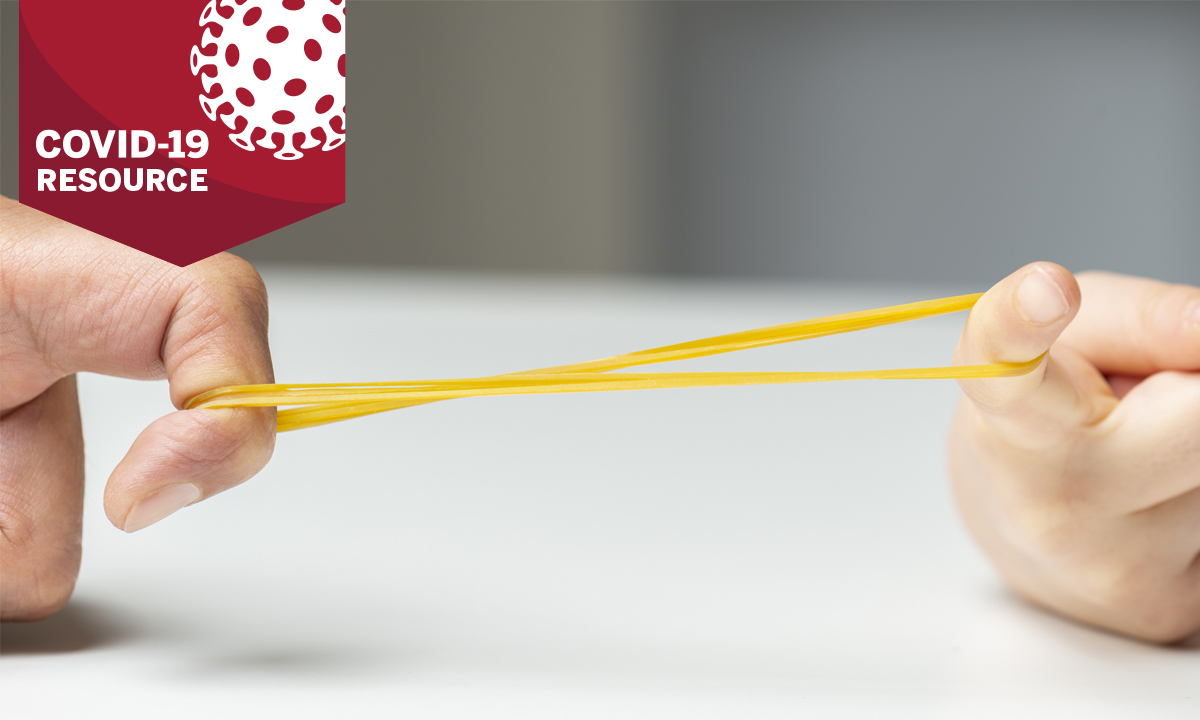
Information regarding COVID-19 has rapidly evolved. The content in this article provides a historical snapshot of events surrounding the date of posting.
As the COVID-19 pandemic continues to grip the nation and cause unprecedented numbers of Americans to become very ill, health care providers, first responders, families, and other individuals in the medical community are experiencing extreme stress on many levels. How they respond can be critical to their own health and well-being. The following article is an excerpt from a webinar conducted on April 1, 2020 moderated by Ajay Singh, MBBS, FRCP, MBA, senior associate dean for Postgraduate Medical Education at HMS and a nephrologist at the Brigham and Women’s Hospital.
With frontline workers in hospitals around the nation coping with an extreme threat posed by the new coronavirus (COVID-19) that would have been unimaginable just a few weeks ago, how they are managing the resulting stress — and the related physical and mental health risks — was the focus of a recent webinar presented by Luana Marques, PhD, director of community psychiatry at Massachusetts General Hospital and nationally recognized expert in Cognitive Behavioral Treatment (CBT). Marques shared her observations on the impact of COVID-19 on essential health care workers. She also offered some suggestions based on the science of anxiety to help people strengthen their resiliency in the face of such uncertainty and suffering.
The Impact of COVID-19
In a very short time, COVID-19 has changed life as we know it for most Americans. And for those working in health care, the impact has been particularly significant, according to Marques. “There's a lot of research that suggests that prolonged chronic stress, regardless of how you dice it, has a negative impact on your health, such as an increased likelihood of heart attack, increased likelihood of mental illness, and a decrease in your immune system,” she says. With so much at stake, it’s critical for people on the frontlines to find new ways to cope and stay in control of their personal situations.
“The new coronavirus began as an acute stressor that started in China, and the numbers in the beginning were small, and then all of a sudden, we had this exponential change in the velocity by which it spread and the threat it poses to all of us, making it a chronic stressor,” Marques explains. “For a lot of our frontline providers, there is now an imminent risk of contracting this virus that all of us are living with on a day-to-day basis,” she says.
In addition, health care providers are worried about spreading the disease to their families. They are worried about their patients. They are seeing levels of suffering and loss they may not have experienced before. All of this is taking a toll on their own well-being in so many ways.
The Risk of Contracting the New Coronavirus
With so much to worry about, the threat COVID-19 poses creates a fight or flight response in health care workers dealing with the situation. While for our ancestors such a response was necessary to help them cope with threatening situations, in a long-term situation like COVID-19, it’s actually creating more deep-set anxiety in frontline workers.
“We’ve really gone from a biologically adaptive fight or flight response that gets us out of danger to this new [more persistent] form for our health care providers,” Marques points out. When experiencing this on an ongoing basis, people have increased heart rate, muscle tension, shortness of breath or shallow breath, changes in eating, trouble sleeping, fatigue, and a weakened immune system.
The Impact of COVID-19 on Mental Health
“A new article on JAMA Psychiatry published just a week ago looked at a cross-sectional of survey of 1,257 health care workers from 34 hospitals in China [where the new coronavirus outbreak began just a few months ago] in a very short amount of time. The scientific data is no different than the clinical and anecdotal data that we’re hearing from our health care providers,” Marques says.
For instance: 71 percent of the responders showed a really significant level of stress, 50 percent had depression, 45 percent had anxiety, and 34 percent suffered from insomnia.
“When our brain gets used to this level of depression, anxiety, and stress, it gets in the way of us being able to work,” she says. “You might notice things like you’re having difficulty focusing. Or, you may find yourself sort of spinning when you try to get things done and not being able to do it. Or, similar to the survey, you may be having trouble sleeping, which then has significant consequences in your ability to focus the next day,” she explains.
Managing COVID-19 Stress
For most people on the frontlines of this pandemic, gaining control of their situation to make it through this difficult time requires a multi-faceted strategy. “I think all of us are feeling out of control. I personally have that sense every day that we don’t know what’s going to happen next. So in a moment of uncertainty, when our brains feels on fight or flight and we don’t know what to do, we need to focus on the things that we can control,” she says.
Some of the elements we can control include:
- Developing social supports: From a psychological standpoint, this can be just listening to somebody, making them feel heard, and finding creative ways to be there for them, she describes. “One thing we can do for our front staff and health care workers is to reassure them how important they are and how amazing the work they are doing in such a way that they really have that sense of self-worth,” Marques says.
- Incorporating relaxation: For someone working in the ER, this may mean just taking two minutes to walk away, focus on breathing, and give their body a break. Some people also benefit from trying progressive relaxation, which involves tensing your muscles and then relaxing them. “Psychological first aid suggests that we schedule this break. In the middle of the day, I encourage you to just set an alarm at a certain time to remind yourself to take a moment to relax,” she says.
- Eating well: Some people may also change their eating under stress, eating more or eating less. “It’s important to ensure that your body is getting the nutrition it needs to keep going, regardless of how fast you’re moving,” she says. This means making sure to eat regular and balanced meals and snacks as best you can.
- Practicing sleep hygiene: “We can try to limit our caffeine intake and avoid caffeine after 3 pm. If you’re lying in bed for more than 20 minutes and you really can’t fall asleep, get up and do something relaxing, but also be kind to yourself and remind yourself that this is a new norm and a different time,” Marques says.
- Maintaining a “normal” schedule: “I suggest that you establish a new schedule. For those of you who are on the frontlines and working nonstop, make sure that the new schedule involves a little time to rest when you come home and disconnect, to be able to give yourself a break from the real threat that you're facing every day,” she says.
- Keeping a journal: “What we know is that in moments of stress, our brain starts to really spin. You find yourself saying things like, ‘How long is this going to happen? Am I going to catch this? What will it look like?’ And those kind of thoughts lead to a lot more emotion,” she says. Capturing these feelings on paper may help you calm the storm and keep you anchored in the moment.
- Exercising: With gyms and parks closed and schedules so busy now for frontline workers, it’s essential to find creative ways to stay active. “Our bodies are like the batteries of a car, which only recharge by driving. So it’s really important for us to spend energy to get more energy. And with the increased level of anxiety and depression, we are seeing, it's really crucial that all of us find creative ways to exercise,” Marques says.
- Keeping a sense of humor: While this can look different for everyone, it’s another way to help the brain to cope with the current situation. “I can tell you that personally, I am not very funny,” she admits. “But, I've watched a lot more things on TV that are funny to give myself a break, to laugh a little more, and to be able to really activate that part of the brain that allows us to have joy in the moment in such a difficult time.”
Building Your Strength
Marques points out that adopting a well-rounded strategy that incorporates all of these important elements can go a long way toward managing the impacts of COVID-19 and the related stress and anxiety. At the same time, it can also help health care providers to build the resilience they need to weather this current crisis and perhaps even come out stronger in the end.
Written by Lisa D. Ellis
-
Featured Panelists
- Ajay K. Singh, MBBS, FRCP, MBA, senior associate dean for postgraduate medical education
- Luana Marques, PhD, Director and Founder, Community Psychiatry PRIDE, Massachusetts General Hospital; Associate Professor in Psychology, Harvard Medical School


